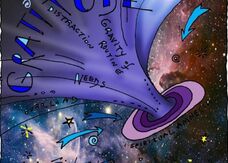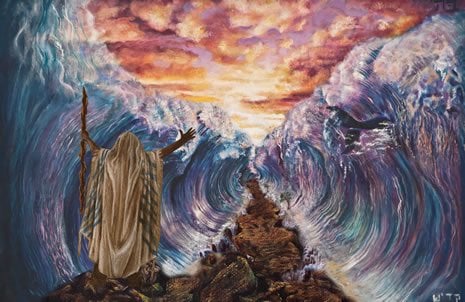| Rescued from centuries of Egyptian bondage, our spiritual ancestors reached the Sea of Reeds. Pharaoh changed his mind and came charging with his army. It took a wall of fire to block them, and a miracle to split the sea so our ancestors could leave Egypt behind once and for all. We were free at last. Then the kvetching began. |
By Rabbi David Evan Markus
Parashat Beshallah 5784 (2024)
(Rabbi David published a prior version of this teaching in The Jerusalem Post.)
It never fails. At first we feel gratitude for gifts and blessings, but memory fades and gratitude drains. We’re not inherent ingrates, but we have limited bandwidth and life distracts us.
Spirituality isn’t what drives most of us in traffic late for an appointment, or in a crowded market, or when good things go south, or while we're watching a game. The divine spark that Judaism associates with each soul, the unifying Oneness we call God and the blessings that abound all around, seem to fade from view against the backdrop of routine, challenge or pressure. We get tunnel vision. We don’t see, so we forget.
Forgetfulness is the human condition. Let’s call it spiritual amnesia.
In this week’s Torah portion (Beshallah), our enslaved ancestors were freed but Pharaoh changed his mind and gave chase. Pinned against the Sea of Reeds, our ancestors forgot their liberation, and their liberator's promise that they'd be free. With truly first-rate snark, they turned on Moses: "Were there not enough graves in Egypt that you took us here to die in the desert?" (Ex. 14:11).
At the moment of Pharaoh's hottest pursuit, when it seemed that Pharaoh would crush or drown the Israelites, an angelic wall of fire blocked the Egyptian army. The sea split revealing a passageway to freedom – and "then" our ancestors really believed (Ex. 14:31-15:1). Crossing on dry land, leaving Egypt behind forever, they sang their freedom in words we still use today. So awesome was their Mi Khamokhah moment (Ex. 15:11) that midrash saw even the “lowliest handmaiden” achieving spiritual heights unattainable by Isaiah, Elijah and other prophets.
Awe could have hard-wired memory and gratitude but, just three verses later, amnesia was back full force. Our ancestors kvetched (Ex. 15:24), lamented leaving Egypt (Ex. 16:3), and even defied their liberator (Ex. 17:3) – all symptoms of a raging case of spiritual amnesia: “What have You done for me lately?” And they'd keep forgetting, again and again, for the rest of Torah.
Here’s a tip for my fellow amnesiacs: spiritual amnesia is a natural part of Torah, because it's a natural part of life. We don't do it wrong when we forget: forgetting is human nature. That's why the purpose of all spirituality is to prod us to remember (Hebrew: zakhor). We literally re-member – bring back to mind – then live in ways inspired by what re-minded us.
Escaping the Black Hole of Spiritual Amnesia
Parashat Beshallah 5784 (2024)
(Rabbi David published a prior version of this teaching in The Jerusalem Post.)
It never fails. At first we feel gratitude for gifts and blessings, but memory fades and gratitude drains. We’re not inherent ingrates, but we have limited bandwidth and life distracts us.
Spirituality isn’t what drives most of us in traffic late for an appointment, or in a crowded market, or when good things go south, or while we're watching a game. The divine spark that Judaism associates with each soul, the unifying Oneness we call God and the blessings that abound all around, seem to fade from view against the backdrop of routine, challenge or pressure. We get tunnel vision. We don’t see, so we forget.
Forgetfulness is the human condition. Let’s call it spiritual amnesia.
In this week’s Torah portion (Beshallah), our enslaved ancestors were freed but Pharaoh changed his mind and gave chase. Pinned against the Sea of Reeds, our ancestors forgot their liberation, and their liberator's promise that they'd be free. With truly first-rate snark, they turned on Moses: "Were there not enough graves in Egypt that you took us here to die in the desert?" (Ex. 14:11).
At the moment of Pharaoh's hottest pursuit, when it seemed that Pharaoh would crush or drown the Israelites, an angelic wall of fire blocked the Egyptian army. The sea split revealing a passageway to freedom – and "then" our ancestors really believed (Ex. 14:31-15:1). Crossing on dry land, leaving Egypt behind forever, they sang their freedom in words we still use today. So awesome was their Mi Khamokhah moment (Ex. 15:11) that midrash saw even the “lowliest handmaiden” achieving spiritual heights unattainable by Isaiah, Elijah and other prophets.
Awe could have hard-wired memory and gratitude but, just three verses later, amnesia was back full force. Our ancestors kvetched (Ex. 15:24), lamented leaving Egypt (Ex. 16:3), and even defied their liberator (Ex. 17:3) – all symptoms of a raging case of spiritual amnesia: “What have You done for me lately?” And they'd keep forgetting, again and again, for the rest of Torah.
Here’s a tip for my fellow amnesiacs: spiritual amnesia is a natural part of Torah, because it's a natural part of life. We don't do it wrong when we forget: forgetting is human nature. That's why the purpose of all spirituality is to prod us to remember (Hebrew: zakhor). We literally re-member – bring back to mind – then live in ways inspired by what re-minded us.
Escaping the Black Hole of Spiritual Amnesia

Our big challenge is that forgetting is like a black hole cloaking its own darkness. Like a black hole’s gravity absorbs visible proof of its existence, so too spiritual amnesia. When we forget, often we forget that we forget. Pulled by the gravity of routine, pain, need, doubt and disappointment, naturally gratitude and faith tend to fade. Sucked into a vortex of distraction and overload, we forget our spiritual core – who we are, who we must be.
In spiritual amnesia, we tend not to connect with spirituality at all. It becomes natural then to ask derisively, “What have You done for me lately?” It’s telling that Torah depicts ancestral spiritual amnesia both during liberation and again immediately after liberation. Forgetting is so human that to depict liberation idyllically, without amnesia and ingratitude, would be a lie. For all of Torah's supernaturalism, Torah is being oh so very honest.
We learn that liberation isn't one and done, but an exquisitely human story of forgetting and remembering anew. It’s why traditional Jewish liturgy evokes this Mi Khamokhah moment twice daily. It's why even unmusical prayer communities always will sing Mi Khamokhah. It’s why Jews retell this story annually at Passover. It’s why Jews must retell of our liberation as if each of us personally came up from Egypt – because we do, again and again.
Beyond liturgy, Judaism offers a big toolkit of spiritual black hole escape tools. Of course, we forget to use them, which why community is so important: we get to remind each other.
One set of tools is visual. This week's Torah portion commands our ancestors to fill a jar with manna and display it to remind about the miracle of food in the desert (Ex. 16:33). In a later portion with a similar name (Shlakh), we tied a blue fringe on garments (tzitzit), “to look at it and remember” (Num. 15:39). The Ark is a reminder. So is every mezuzah – if we pay attention.
Another set of tools concern fixed times. Shabbat is literally to “remember” this week's Exodus from Egypt (Ex. 20:8). Yizkor on Yom Kippur, Passover, Shavuot and Sukkot is called Yizkor precisely because it's about "remembering" the soul's journey. In classical Judaism, everything we eat, every beauty we see, everything we buy, every time we use the bathroom, is an opportunity to re-member and re-mind.
A third set of tools concern re-minding, literally. Judaism's tradition of learning is literally to re-wire the mind and heart, to become less prone to spiritual amnesia. As we learn to see ourselves, the world and the flow of time through new eyes, we come to see reminders all around us. It's the same with every mitzvah we do: the more we engage, the more our minds re-wire around those kinds of actions, which then become more re-minders.
So spiritual amnesia isn’t failure but an inherent part of liberation’s journey. Just as our spiritual ancestors forgot and needed eminding, so do we: Each day, each moment, is full of reminders. We have tools for re-membering, and we can help each other use them. After all, as Talmud puts it, none alone can free oneself from prison (Berakhot 5b).
Joining together in these ways, we can break free and uplift spiritual amnesia into the truest and most enduring journey of freedom.
In spiritual amnesia, we tend not to connect with spirituality at all. It becomes natural then to ask derisively, “What have You done for me lately?” It’s telling that Torah depicts ancestral spiritual amnesia both during liberation and again immediately after liberation. Forgetting is so human that to depict liberation idyllically, without amnesia and ingratitude, would be a lie. For all of Torah's supernaturalism, Torah is being oh so very honest.
We learn that liberation isn't one and done, but an exquisitely human story of forgetting and remembering anew. It’s why traditional Jewish liturgy evokes this Mi Khamokhah moment twice daily. It's why even unmusical prayer communities always will sing Mi Khamokhah. It’s why Jews retell this story annually at Passover. It’s why Jews must retell of our liberation as if each of us personally came up from Egypt – because we do, again and again.
Beyond liturgy, Judaism offers a big toolkit of spiritual black hole escape tools. Of course, we forget to use them, which why community is so important: we get to remind each other.
One set of tools is visual. This week's Torah portion commands our ancestors to fill a jar with manna and display it to remind about the miracle of food in the desert (Ex. 16:33). In a later portion with a similar name (Shlakh), we tied a blue fringe on garments (tzitzit), “to look at it and remember” (Num. 15:39). The Ark is a reminder. So is every mezuzah – if we pay attention.
Another set of tools concern fixed times. Shabbat is literally to “remember” this week's Exodus from Egypt (Ex. 20:8). Yizkor on Yom Kippur, Passover, Shavuot and Sukkot is called Yizkor precisely because it's about "remembering" the soul's journey. In classical Judaism, everything we eat, every beauty we see, everything we buy, every time we use the bathroom, is an opportunity to re-member and re-mind.
A third set of tools concern re-minding, literally. Judaism's tradition of learning is literally to re-wire the mind and heart, to become less prone to spiritual amnesia. As we learn to see ourselves, the world and the flow of time through new eyes, we come to see reminders all around us. It's the same with every mitzvah we do: the more we engage, the more our minds re-wire around those kinds of actions, which then become more re-minders.
So spiritual amnesia isn’t failure but an inherent part of liberation’s journey. Just as our spiritual ancestors forgot and needed eminding, so do we: Each day, each moment, is full of reminders. We have tools for re-membering, and we can help each other use them. After all, as Talmud puts it, none alone can free oneself from prison (Berakhot 5b).
Joining together in these ways, we can break free and uplift spiritual amnesia into the truest and most enduring journey of freedom.


 RSS Feed
RSS Feed